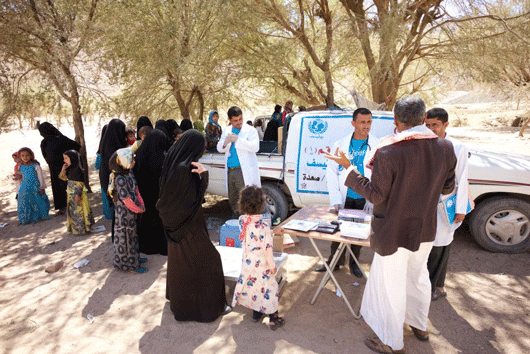
Background
Sixteen months of conflict have devastated Yemen’s health system, and tipped what was already a grave humanitarian crisis - featuring widespread food insecurity and malnutrition among other challenges - into a catastrophe. With no end to the fighting in sight, little attention has been devoted to longer-term questions about reconstruction. But evidence from other countries suggests that starting these discussions early - even if difficult in the midst of conflict - has a critical bearing on the success of future health reconstruction work. Diaspora communities, who often remain closely engaged with their countries of origin, have a key role to play in peacebuilding and development efforts of this kind.
Evidence on the negative impacts of conflict on health in Yemen is now increasingly clear. The toll in deaths and injuries has been heavy: the most recent WHO situation report documents over 6,500 deaths and more than 32,000 injured since March 2015 -probably conservative figures given the known difficulties of tracking mortality in conflict settings. Some 2.8m Yemenis have been internally displaced over the same period. Data presented at the workshops showed that under-five child mortality rose from 53 per 1,000 in 2013 to 62.4 in 2015, compared with a projected 42 per 1,000 if pre-war trends had continued. It is estimated that progress on under-five mortality in Yemen had been set back about 10 years by the end of 2015. Widely anticipated impacts on nutritional status are also being realised: prevalence of wasting among Yemeni children had increased by 25% from 2013 data by the end of 2015.
Health system impacts are also increasingly apparent. Service delivery continues to be hampered by the volatile security situation and international agency support for health services is limited. Insecurity is particularly pronounced in provinces like Aden and Taiz, and the situation in some governorates - notably Sa’adah in the North - is extremely challenging. Agencies are predominantly focusing on provision of emergency and trauma care, water and sanitation, and non-food items. Specialist care has become increasingly difficult because of irregular supplies (including electricity and water) and health worker flight. Musāhamatna are actively documenting the impact of the conflict on the health system and will be conducting further work in this area over the coming months.
Determining how the situation might develop over the coming months and years is extremely challenging. However, there was an emerging consensus across the workshops that while access to basic healthcare amid ongoing intense conflict will continue to be patchy, and dependent primarily on emergency and humanitarian approaches, there may be opportunities to rebuild the health system in more stable areas to ensure improved access to basic healthcare, and as a foundation for a better overall health system.
Priorities for action
Workshop participants recognized the crucial importance of health workforce development and support in Yemen, and a number of proposals focused on this - including supporting post-conflict return of health workers (from both within the country and from abroad), through a combination of links with host countries, negotiating temporary release from contracts for diaspora workers, and better pay. But there was also recognition of major health system weaknesses pre-conflict around accountability, transparency and corruption that have now been complemented by governance fragmentation and financing shortfalls. Participants agreed that grass-roots leadership structures would likely play an important role in filling the governance gap during any recovery period, and would need to be supported through improved training, and alternative financing models possibly including community-led financing.
From a health service perspective, trauma-related presentations represent a substantial part of the burden on health services and will do so for the foreseeable future - both acutely and chronically (through support with prosthetics and long-term physical and psychological rehabilitation). But there is also an increasingly urgent need to build up effective primary health care and preventive care systems to reverse increases in child and maternal mortality, including efforts to tackle malnutrition. Work to develop tailored basic care packages reflecting complex local service challenges and new realities on the ground in Yemen are urgently needed. Finally, there was widespread recognition of the critical importance of accurate health information. Participants agreed that without this, effective reconstruction planning would be impossible, and urged greater attention to surveillance for primary causes of mortality, using community-based information gathering approaches; strengthening existing health surveillance systems; and setting up surveys to track health needs in the worst affected areas of the country.
Challenges of diaspora engagement work - and some next steps
A key achievement of this project has been in demonstrating the feasibility and value of engagement work on post-conflict reconstruction with diaspora communities even in the context of ongoing fighting. Relatively politically neutral policy questions (such as health) offer obvious opportunities for bridge-building, and participants in the workshops consistently highlighted the constructive and positive nature of these events. However, engaging diaspora members in long-term thinking presents challenges when many are understandably primarily concerned with providing more immediate support to their families and communities in Yemen. Future engagement work will need to carefully consider how to ensure commitment to long-term reconstruction planning given these competing demands, including a greater emphasis on near-term activities such as fund-raising for relief, remote support for health workers or health worker exchanges, where security permits this.
Next steps for the project include broadening the process of engagement - both among the Yemeni diaspora and in Yemen itself - to build consensus on a vision for the health system there. In addition, we are looking at ways to bring the insights and engagement of the diaspora community to ongoing and planned processes for health system development in Yemen, and to the agencies currently working on these. Finally, technical work to develop specific proposals responding to some of the high-level needs identified above is also required.
Source: Health Systems Global, Edited by Website Team